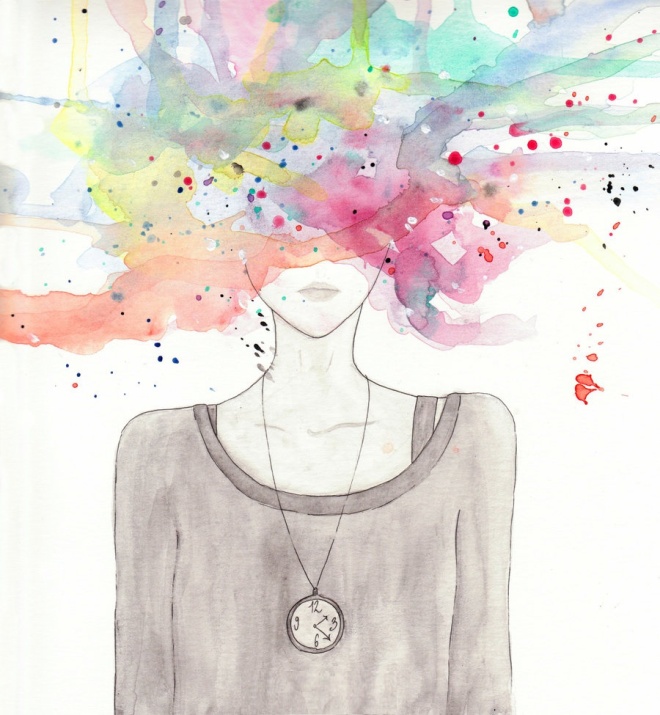
- Overthinking by kiwitachan d4rlm6w
It is not until now when I start taking BCM212 class that I realize I am either lazy on searching information about something new, or often search for trivial things, such as celebrity news (low-key admitting that I often go on Kenh14.vn, which is known as 14channel.vn while I am not a teenager anymore haha). Although I am aware of how it affects my reading habit and curiosity, I find it hard to navigate myself on the Internet whenever I am online with numerous sources of information to sort out, especially those fast-reading, easily-to-feed-me-up like two-minute instant noodles.
Since I am moving into my second year, I have more serious thoughts about how I read and what I read. Turning 20 makes me feel like reading news from the 14channel.vn is childish and a poor taste while I need something to help me grow up. Therefore, this year, I decide to be more exposed to different types of news and increase the volume of weekly readings, starting with the subject reading (I am very ashamed to say that I did not do much on reading materials in my first year). The reason for this is because I feel the urge of self-control and self-regulation, as this semester I have two subjects offering online lectures and my language minor does not have a PASS session anymore, which means discipline is required and independence is a must for the best results of my studies.
“The Internet never says, ‘You’ve had enough, now go away”
– Nir Eyal –
I consider myself that I am not a curious person, or no longer a curious one. All those heart-breaking headlines about refugees and the war on terrorism seem to be so faraway from me just like the distance between Australia and Syria. I am not certain whether this is because other less serious, entertaining news hooks me on more, or a fatigue got me, or maybe both. Another reason for being less curious might be my dependence in receiving information. When I was in Viet Nam, I was passive in consuming news by listening to it at dinner time with my family (The only channel my parents turn on at 7 p.m is news), while here in Australia, I am on my own and do not actively reach out for news.
The most recent search I have done which sent me to other searches was the journal article Anti-Access/ Area-Denial: Not enough to deter China written by Ngô Di Lân for the Vietnamese website of International Studies. I know about him because he is a well-known student in the Vietnamese community studying International Studies. As a fellow of the same area, I follow him on Facebook to gain inspiration and perspective on political issues. Thus, when I saw his first writing for the website, I was triggered to find out more and his work kept sending me to access other related sources he linked in the post and shared on his Facebook wall. Lân’s work really intrigues me to search for what A2/AD is, how fait accompli is applied by China and why it is important for the US to join the Trans-Pacific Partnership Agreement (Before I just think it is unfair for the US to gain little-to-no economic benefits by joining TTP to support small countries like Viet Nam in the South China Sea dispute, but obviously it means more than that). I found many interesting academic works to explore more in the International Studies world and downloaded all those cool stuff in my small laptop to prepare for my future tasks in INTS subjects.
After the search, I realize that somehow that curiosity is still in me (thanks God it is still here) although it does not strike me hard. I believe that the way I read and choose my sources of information are behind the decrease in my curiosity to new things. I am fully aware of that and I am really trying to adjust my reading style to a more healthy diet.
References
BBC News 2017, “TPP: What is it and why does it matter?”, BBC, 23 January, viewed 7 March 2018,
<http://www.bbc.com/news/business-32498715>.
Beckley, M 2017, “The Emerging Military Balance in East Asia: How China’s Neighbors Can Check Chinese Naval Expansion”, International Security, vol. 42, no. 2, pp. 78-119.
Collin, KSL 2015, “Bejing’s Fait Accompli in the South China Sea”, The Diplomat, 16 April, viewed,
<https://thediplomat.com/2015/04/beijings-fait-accompli-in-the-south-china-sea/>.
Johansson, S 2008, “Gossip, Sport And Pretty Girls”, Journalism Practice, vol. 2, no. 3, pp. 402-413.
Mele, C 2017, “Fatigued by the News? Experts Suggest How to Adjust your Media Diet”, The New York Times, 1 February, viewed 7 March,
<https://www.nytimes.com/2017/02/01/us/news-media-social-media-information-overload.html>.
Ngô, DL 2018, “Anti-Acess, Area-Denial: Not enough to deter China”, Nghiên Cứu Quốc Tế, viewed 7 March,
<http://nghiencuuquocte.org/2018/02/26/chong-tiep-can-chong-xam-nhap-chua-du-de-can-trung-quoc/>.
Note: All of my works related to this project have been uploaded online. You can easily navigate these posts by clicking “BCM212” and then “BCM212 Research Project” (or here) for more details on progress and my portfolio.
This “instant noodle” habit is one that really has made me think about deliberation. How do we act deliberately and with discrimination in an informationally full world, that encourages us to see all the bits and pieces of fact as worth the same? So like you I made a choice to be careful where I seek out news.
But at the same time I’m finding that I’ll often get distracted because I start in one place and end up in another. So the question for me is about how we notice that we’re reaching for the instant noodles.
Is this about something we could call information mindfulness? Like mindful eating? (https://www.mindful.org/6-ways-practice-mindful-eating/)
LikeLiked by 1 person